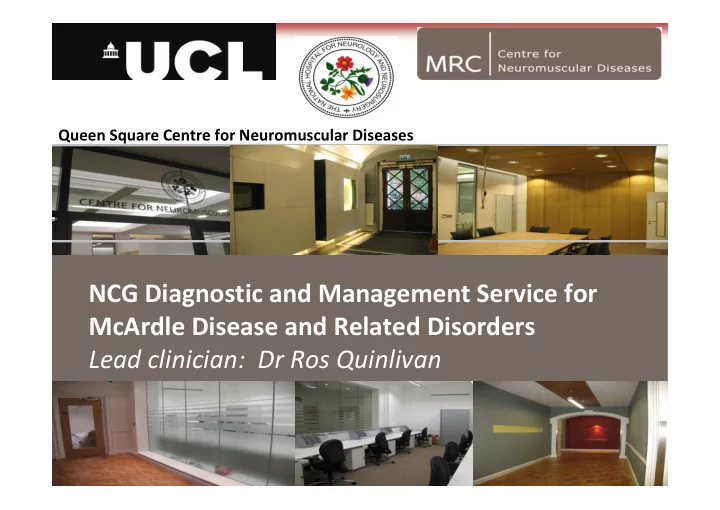

Queen Square Centre for Neuromuscular Diseases NCG Diagnostic and Management Service for McArdle Disease and Related Disorders Lead clinician: Dr Ros Quinlivan
McArdle disease • Described 1951 • Autosomal recessive • Myophosphorylase deficiency • Frequency 1:100,000 – 1:350,000 – 200-600 cases in UK • Diagnosis – Ischaemic/non-ischaemic exercise test – Muscle phosphorylase – DNA testing of myophosphorylase gene (common mutation - R50X)
Anaerobic/aerobic exercise Anaerobic Aerobic Sprinting, carrying heavy Jogging, cycling, walking loads, weight lifting, walking uphill, tensing of muscles Fatty acids Glycogen myophos phorylase β -oxidation Glucose ATP Lactate, ATP
Symptoms • Fatigue and pain within a few minutes of exercise – Muscle spasms, contractures – Myoglobinuria – Second wind (improvement of exercise performance after initial wekness) – Can lead to rhabdomyolysis • Persistently increased CK • Increased risk of gout
NCG service • First discussions with NCG – 2003 • Service to cover – Any patient with a suspected muscle Glycogenolytic/ Glycolytic Disorder – Any patient with a confirmed muscle Glycogenolytic/ Glycolytic disorder – Include investigation & management
Diagnostic Service • Diagnostic – Clinical evaluation/ diagnosis – DNA – Muscle biopsy
DNA • R50X/ G205S Hot spot analysis • Positive diagnosis in 70%, British Caucasians • Heterozygosity in 95%, British Caucasians • Birmingham Children’s Hospital • Sheffield Children’s Hospital
Full gene Sequencing • PYGM (Myophosphorylase) • PFKM (Muscle phosphofructokinase) • PHKA1 (Phosphorylase b kinase subunit A1) • PHKB1 (Phosphorylase b kinase subunit B1) • Direct access directly available via NCG form if clinically relevant
Muscle Histology/ Histochemistry • Dr Janice Holton • Pathology review biopsy slides • Histochemical staining for phosphorylase and PFK • MDT review of slides
Muscle Biochemistry • Ralph Wigley Clinical Scientist • Service is being set-up • Not yet fully available • Aim to identify rare glycolytic storage disorders e.g. muscle phosphorylase b kinase deficiency • To double check conflicting results i.e. where muscle histochemistry is negative but no mutation on gene sequencing
Clinical Service • Medical assessment and diagnosis of suspected cases – Patients presenting with exercise induced myalgia and /or rhabdomyolysis • Investigation includes – Exercise assessment – Muscle and skin biopsy (including fatty acid oxidation defects and muscular dystrophy) – Genetic Studies (including fatty acid oxidation defects and muscular dystrophy)
Clinical service • Aim – Provide information to patients on their condition – Encourage regular aerobic exercise – Reduce frequency of rhabdomyolysis episodes – Advice for management on acute rhabdomyolysis
Clinical service • Management clinic – Walking assessment – Quality of life assessments – Motivational techniques to increase exercise capacity – Weight and dietary management – Psychological input to reduce anxiety – Exercise advice
Multi-Disciplinary Clinical team • Dr Ros Quinlivan • Dr Richard Godfrey – Consultant in – Exercise Physiologist Neuromuscular Disease • Dr John Buckley • Miss Victoria Davies – Exercise Physiologist – Physiotherapist • Miss Heidi Chan • Mrs Andrea Beggs – Dietician – Clinical Nurse Specialist • Ms Charle Maritz • Dr Jatin Pattni – Dietician – Clinical Psychologist • Miss Charlotte Ellerslie – Dietician
Peer Support • Andrew Wakelin, President AGSD present at clinics. • Patients encouraged to meet one another • Information about support group and their activities given
Providers • Dr Ros Quinlivan – Queen Square Centre for Neuromuscular Disease – Dubowitz Neuromuscular Centre, GOSH • Dr Janice Holton • Institute of Neurology, Queen Square • Dr Richard Kirk – Sheffield Children’s Hospital • Dr Sarah Ball (Mary Anne Preece) – Birmingham Children’s Hospital • Professor Simon Heales – Enzyme Laboratory GOSH
Developmental History 2003 First discussion with NCG 2007 Application submitted 2008 Decision by NCG deferred 1 yr 2009 NCG application approved 2010 Deferred 1 yr due to Dr Quinlivan’s move 2011 Contract signed 2012 Physiotherapist and Nurse appointed
Service Pathway Patient with GP, Neurology, Myalgia/ Paediatric, Rheumatology NCG Centre Rhabdomyolysis or Muscle service For diagnosis or management R50X/G205S Muscle histology / histochemistry Muscle biochemistry Gene sequencing: PYGM, PFKM, PHKA1, PHKB1, PGAM
Referrals • For all referrals please send a completed form to the relevant provider • For clinical/muscle biopsy assessment please send form electronically with a referral letter • Contact numbers and NCG request forms can be downloaded from CNMD website http://www.cnmd.ac.uk/
Queen Square Centre for Neuromuscular Diseases Acknowledgements: National Commissioning Group Association for Glycogen Storage Disorders Muscular Dystrophy Campaign Care and Research
Recommend
More recommend